That's all for now
I'm signing off for the day and will be avoiding the evening's cocktail party circuit to head back to the quiet town of Bytom, where I'm staying. I asked my host last night where I could find restaurants in the town and he told me: “Near the station. We have a McDonald's and a KFC.”
An evening of culinary delights beckons.
More on Indian solar
As the current panel discussion is half in French, here's some more details from Indian MNRE Minister Anand Kumar.
The Minister mentioned electric vehicles in passing, introducing the topic by admitting: “EVs, we all know, will be there,” as he discussed disruptive technologies.
Mr. Kumar added: “Many manufacturers have said they will start manufacturing EVs in India,” but he did not expand further. India has seen a very disappointing rate of EV take-up to date.
The minister addressed the criticism of a lack of grid infrastructure in the nation by explaining what the federal government was doing to address the situation.
“We're trying to create an enabling environment,” he said. “We're trying to enhance ways of doing business in the country. Quite often we get comments from investors that we don't have enough transmission architecture so we're trying to create special solar and wind zones and get the land earmarked for these parks.
“Based on that, we know how much transmission will be required to connect these zones. We're going to be proactive to create transmission and distribution infrastructure, rather than being reactive.”
He also offered a robust defense of reverse bidding auctions, saying: “In the last year, the tariffs have gone from INR5 to INR2.44/unit [kWh] for solar. Compare these prices elsewhere, on an apples for apples basis – they are globally competitive.”
Roome for improvement
Mind you, having said that, John Roome, Senior Director for Climate Change at the World Bank Group has just closed the session with an impassioned defense of the power of public sector to renewable energy tech cost reductions in the private sector.
“We have seen the price of solar panels fall dramatically,” said Mr Roome. “Batteries are not economical at scale at the moment, but if we can direct procurement mechanisms at scale and offer risk mitigation strategies for early investors, we can lever a public sector approach to drive down prices in the private sector.”
He deserves a bigger audience.
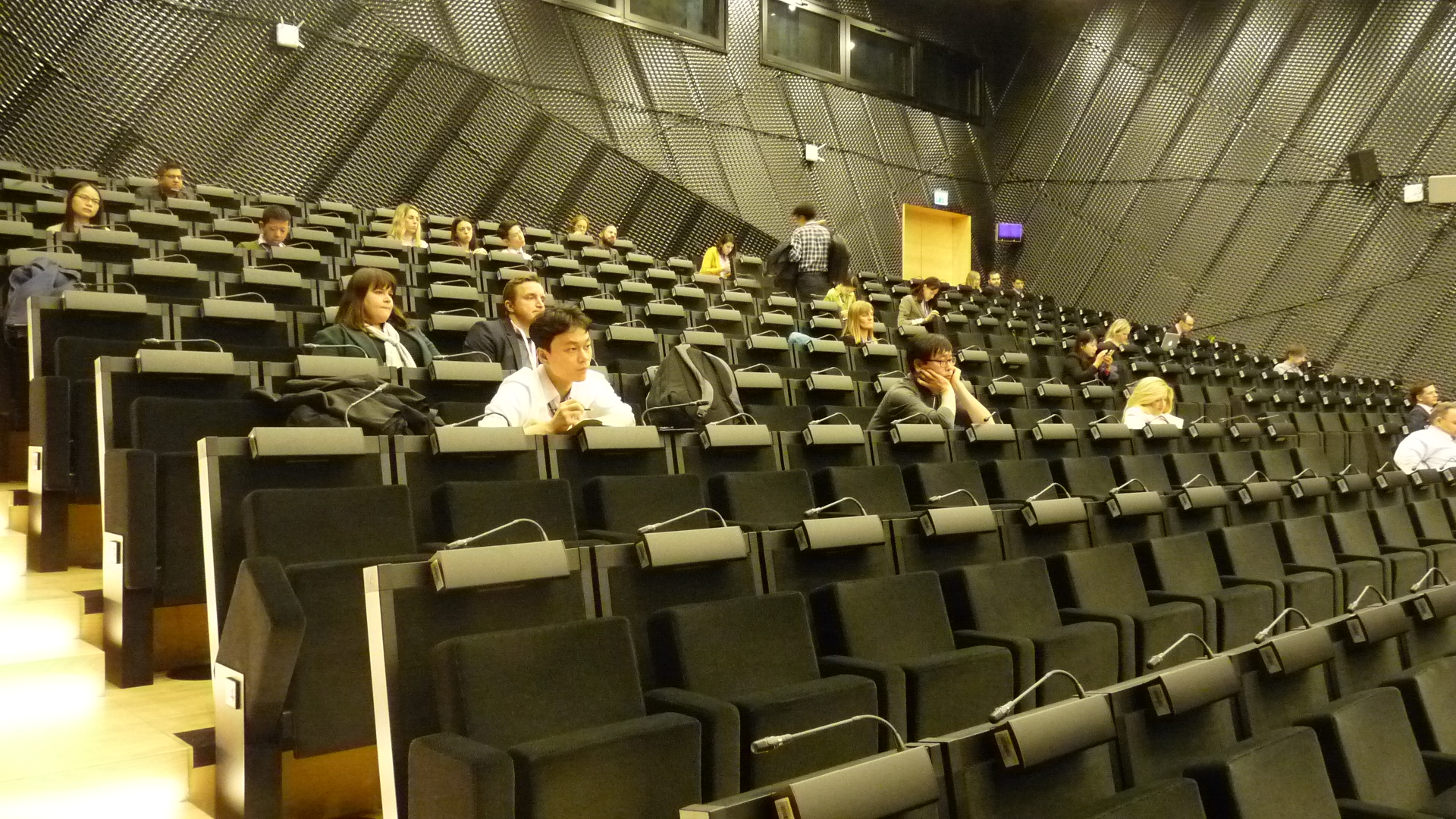
Back to business
I'm back in the largely deserted lecture theatre where worthy topics are discussed and discomfitingly few journalists are present to record them.
I'll be yoked in here for what is left of my day because, ironically enough given all the talk of energy and storage, my laptop's battery warning light is flashing and this is the only place I've found with power points.
There is a certain irony to the fact the Indian Minister for New and Renewable Energy has to battle away in a tiny, open-plan presentation area when there are perfect acoustics and microphones in here, a room with as many camera operators as journalists.
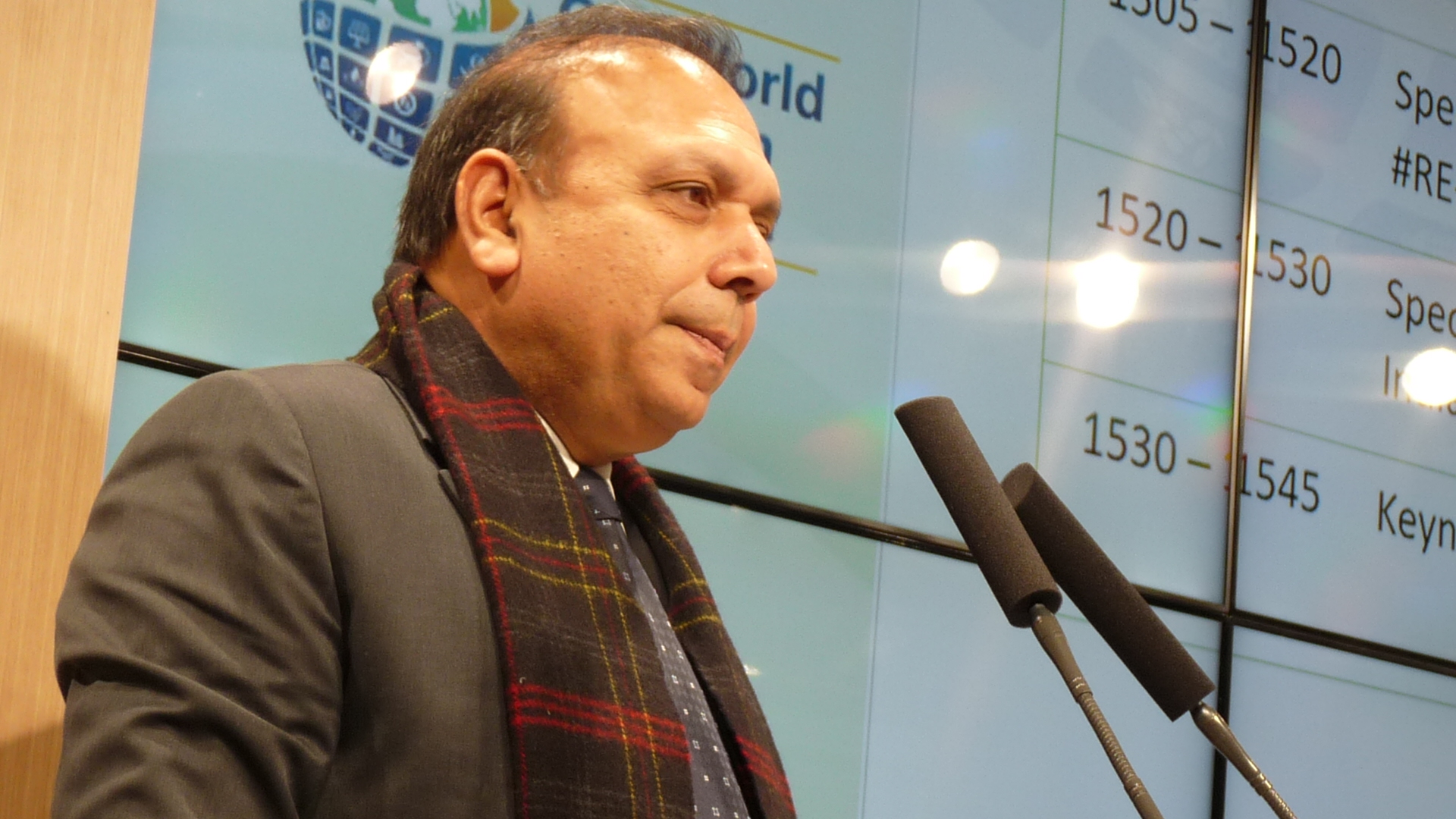
Indian minister takes the stage
Next up is Anand Kumar, secretary of India's Ministry of New and Renewable Energy (MNRE).
Amid talk of India's solar achievements, Mr. Kumar revealed the Indian government plans to introduce customs duties to batteries to drive its Make in India ambition.
“Storage is going to play a critical role,” he told attendees, “As the price of batteries comes down, there's going to be huge disruption. At the moment storage becomes affordable, we may move towards a grid-free world.
“We're going to bring a focus on manufacturing nationally. We have no customs duty on battery cells, we're going to increase the custom duty gradually, so that both battery packs and battery cells are made in India.
“We will offer concessional finance to investors that plan to commit to making battery cells and battery packs in India.”
That's a policy development that is unlikely to be welcomed by the solar lobby, especially given Mr. Kumar's admission he expects the price of batteries to remain inhibitive until around 2024-2025.
Mr. Kumar also made mention of Solar Energy Corporation of India's recent, undersubscribed manufacturing-linked 10 GW solar tender, without mentioning it only drew one bid.
Asked what lessons had been learned from the exercise, he told pv magazine: “The bid has not failed, the bid has been responsive and we will look to bring in more bidders to lead to more manufacturing.”
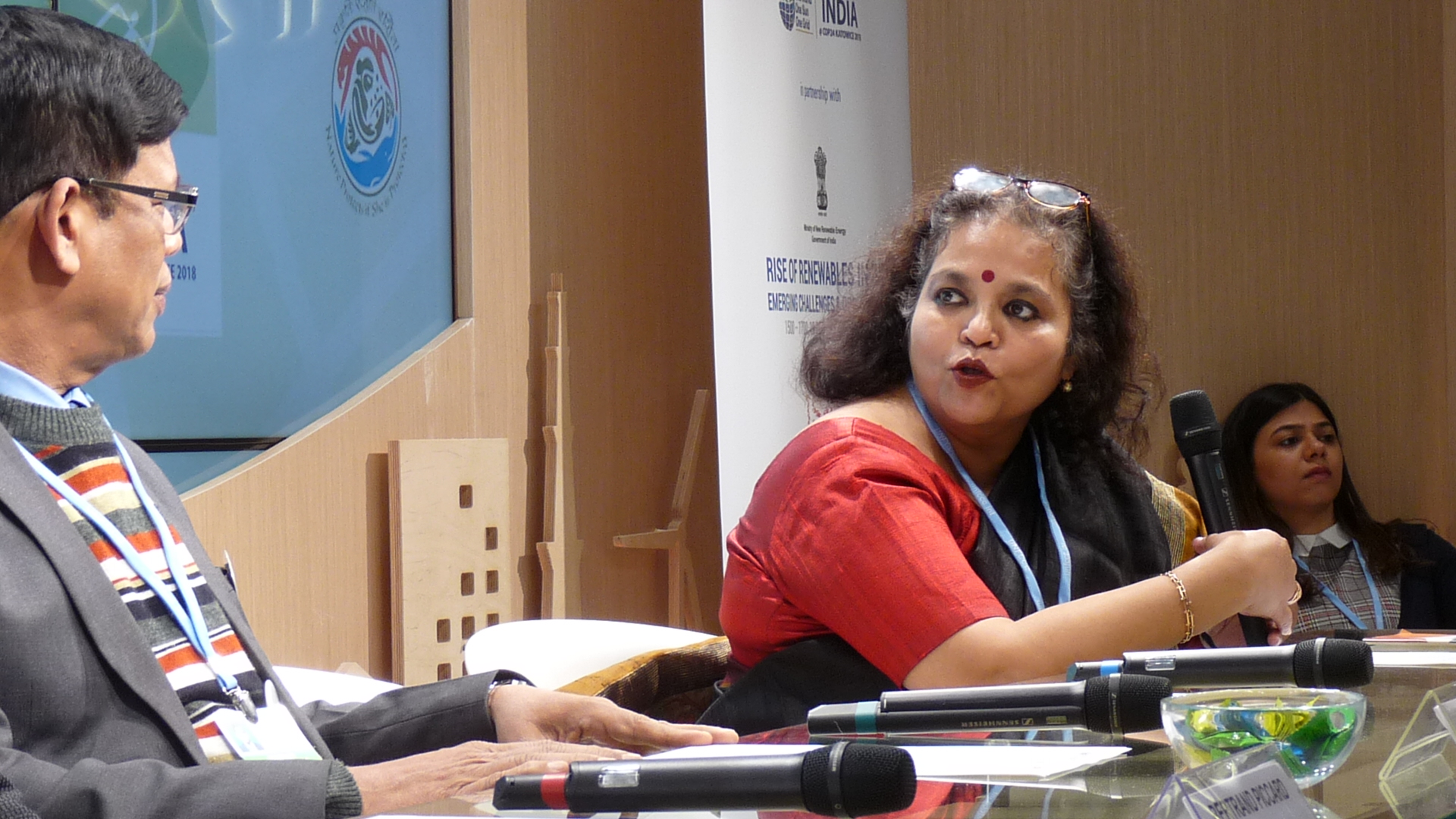
The Rise of Renewables in India
In the Indian pavilion, Upendra Tripathy is speaking about the achievements of the International Solar Alliance, although he is having to battle with considerably louder microphones next door, I think from Brazil.
Mr Tripathy opened by explaining electricity, and lighting, saves lives, and gave the example of his village, where the introduction of lighting has seen the number of snake bites fall.
Asked by pv magazine whether the low tariffs seen for solar power in India are sustainable, Mr Tripathy said: “Once you go through [a market system], you can't tell them [solar companies] ‘don't go too low'. The people who are voting low are people from Harvard. They have access to the best brains, the best computers and modelling. The PPAs are for 25 years, and I'm sure they must be taking care of that.”
Now it's Dr Bertrand Piccard, pilot of the Solar Impulse solar aircraft. In his address, he says: “When you don't need to fight for energy, you have peace… you have social stability.”
He remarks upon how the first Solar Impulse flight changed the attitudes of villagers to the introduction of solar power in the most remote villages of Morocco. Explaining that villagers initially opposed the move and insisted they wanted a grid with cables like everyone else, Dr Piccard says people lined the route of his flight to see the aircraft and then returned to the authorities and said ‘we have changed our mind, we want to be modern'.
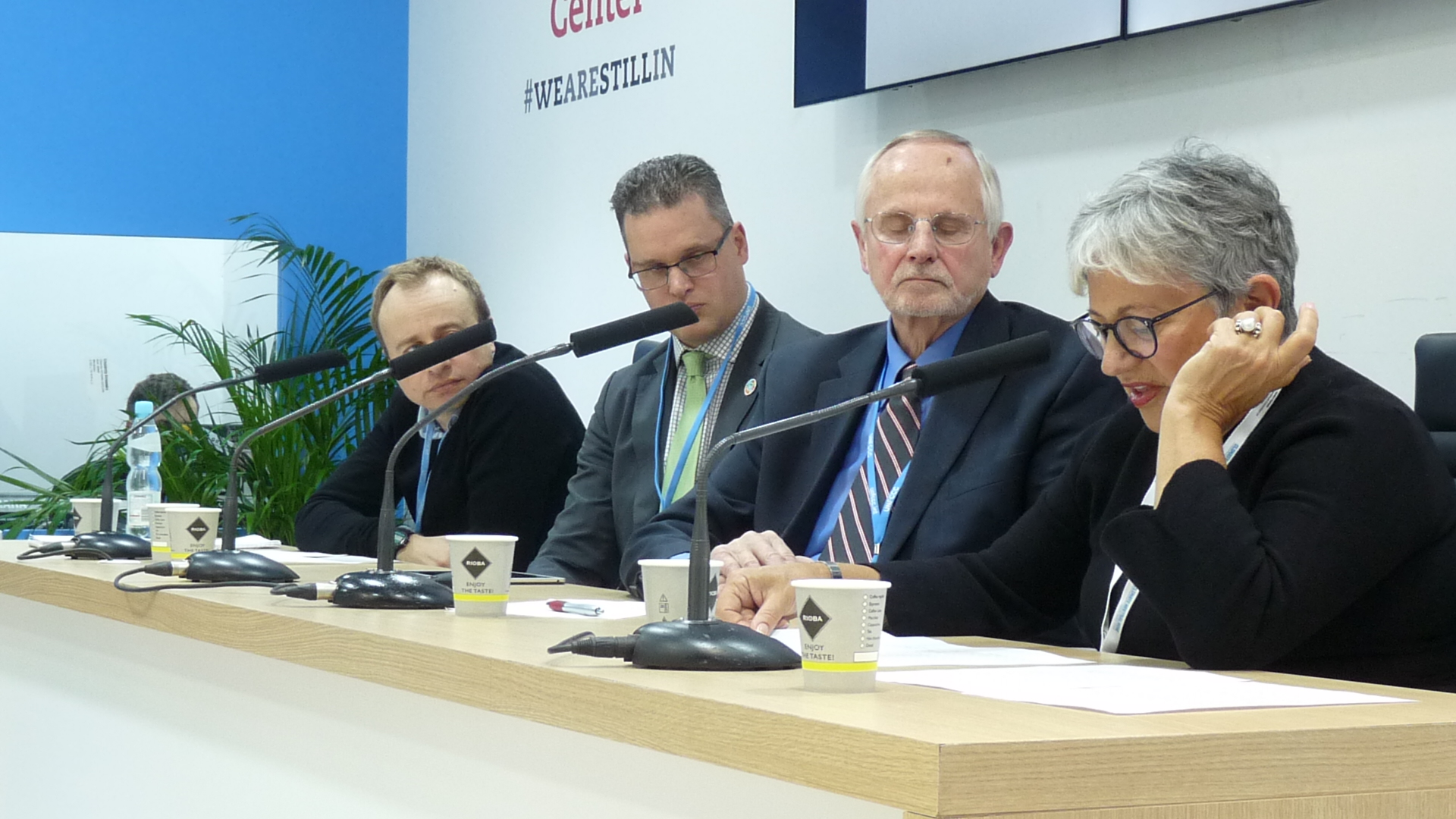
#WEARESTILLIN
I've dropped in to the Climate Action Center area, where a panel discussion is expounding on what states and local governments can do to combat climate change at a sub-national level.
One member of the panel claims 15 Republican senators have signalled an intent to follow the state of California's lead – in this case, referring to the state's decision this year to ban the use of hyper polluting hydroflourocarbons (HFCs) in new refrigeration and air conditioning units.
The sentiment could apply broadly across climate change mitigation measures though, given the White House had ruled the Environmental Protection Agency had no powers to regulate the market, prompting California's decision.
With a strong consensus among the Democrat caucus, the panel member in question says that bodes well for the Senate to follow the lead being taken by the more progressive states on a national basis and issuing an outright ban on HFCs.
Another member of the panel has remarked upon the fact a lot of the governors elected in the past year are adopting climate change policies as a central plank of their administrations, regardless of what is happening in the White House.
Too little - is it too late?
Famous last words… I was reeled back in to the plenary by the remarks of Norwegian minister Ola Elvestuen who lauded the UN's $100 billion climate finance commitment but added: “We have this at a time when emissions are rising and we have an IPCC report that says we are on track to fall far short of the 1.5C global warming target.”
He was followed by Grenadan government representative Simon Stiell who said, perhaps in a pointed response to Saudi Arabia's comments: “The support we receive is invaluable, as we address our climate challenges.”
He also picked out India's question earlier on about whether the actions being taken are adequate, Ecuador's call for trust and co-operation and the blunt address from the floor by the Maldives representative, who said we are going in the wrong direction in some areas.
The Grenadan minister added the most sobering closing note when he pointed out the cold, hard figure from this pre-2020 stocktake exercise is that global emissions are at the moment only 11% lower than in 2005. That compares with targets set by industrialized nations around the world aiming for 20% or more reductions.
Food for thought. Which reminds me…
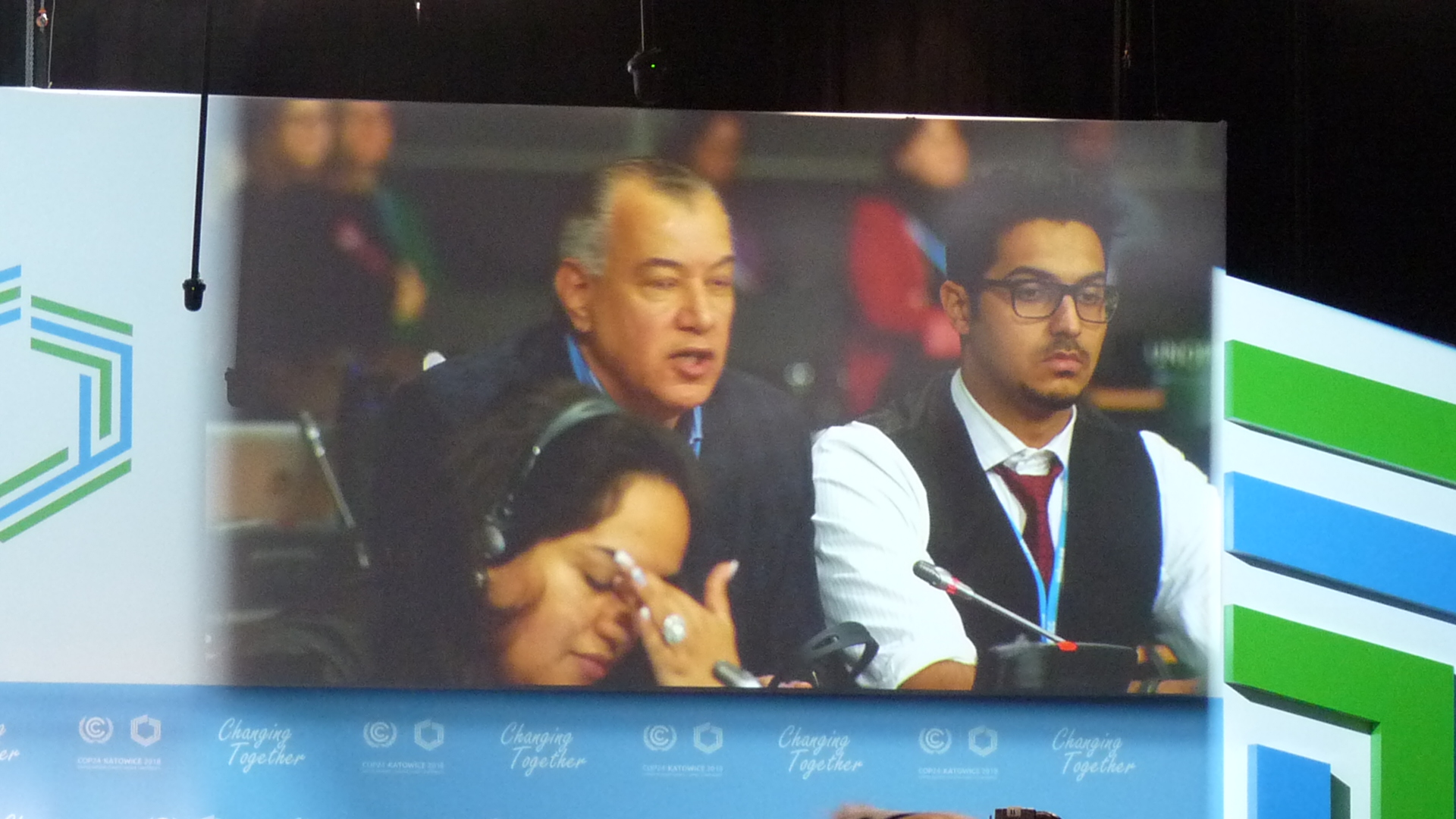
Saudi representative weighs in
The feeling of unity has been shattered by the representative of Saudi Arabia, who has criticised the confusion of climate finance with development funding.
And in what may have been a dig at the EU spokesman previously vaunting the bloc's climate change credentials, he reminded the conference: “I think we need to focus on the need for developed countries which have gone through the Industrial Revolution [to fund] the need for developing countries to adapt to that.
“We are not talking about donors and recipients, we are not a charity. And we do not see loans as part of a commitment to developing countries, because developing countries [given loans] are paying for their own actions, with a premium on top of it.”
It's tempting to wonder whether these are genuine grievances, or an example of the kingdom pushing back against the worldwide condemnation it has endured since the murder of journalist Jamal Khasoggi in the Saudi embassy in Turkey. Or is Saudi making a bid to be included as a recipient of climate finance, on the basis it did not undergo the Industrial Revolution?
Weighty matters indeed… maybe it's time for a bite to eat.
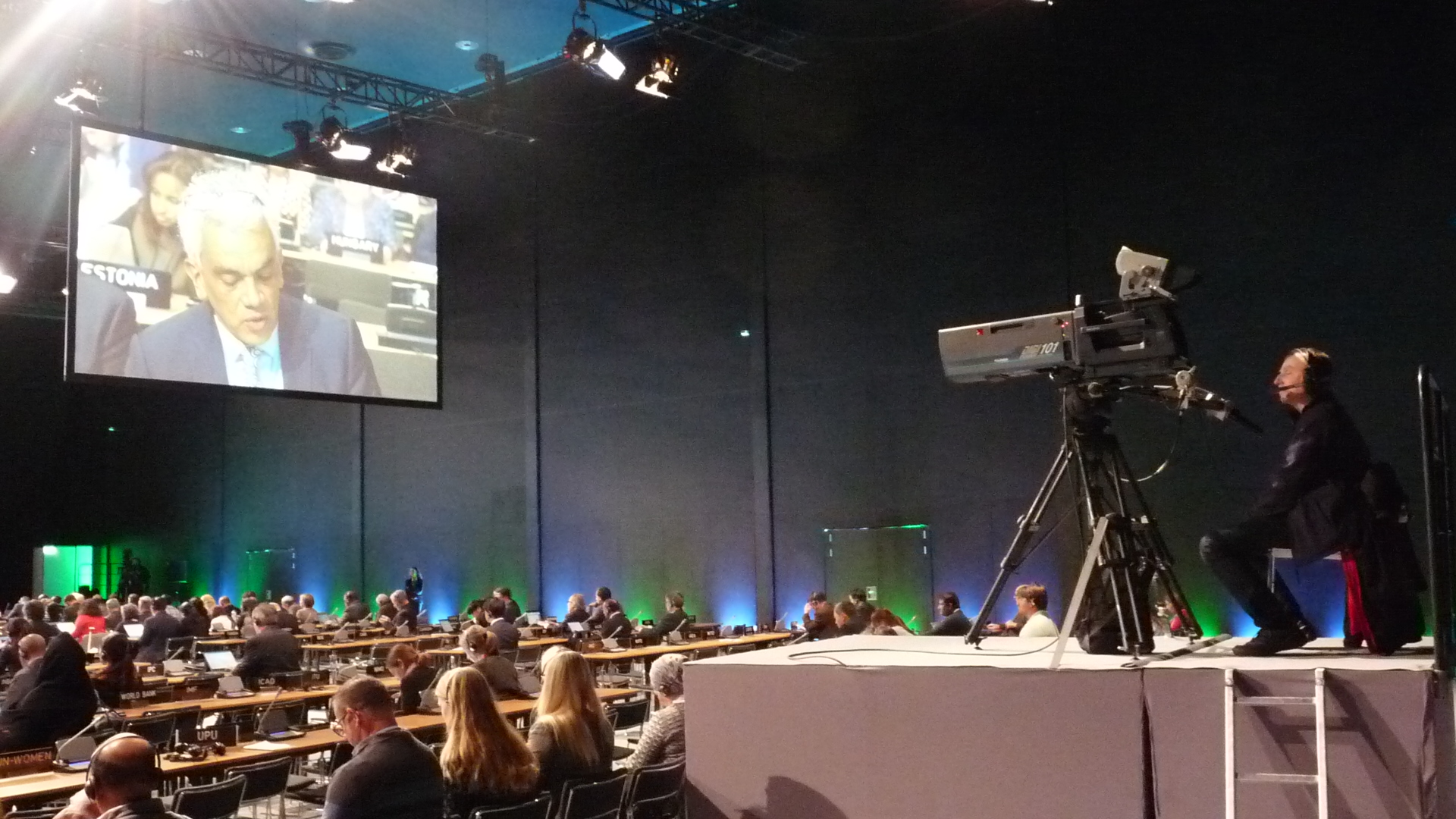
The serious business
Just to prove there is some serious political business going on in Katowice, I've wandered into a plenary session that is a ‘stocktake' on what has been achieved towards the UN's climate goals for 2020.
Initially Colombia's representative had the floor, and I'm afraid my Spanish isn't sufficient to relay quotes in detail, but there were broad commitments to the UNFCCC's ambitions.
A representative from the EU briefly took the mike to emphasise the political bloc and its member states are the largest contributors to climate finance and to restate an ambition to raise $100 million of climate finance by 2020, from public and private sources. It is a proud achievement but one that is likely to polarise MPs at Westminster, ahead of tomorrow's controversial Brexit vote.
A spokesman for the Green Climate Fund is currently on the stage but delegates are trickling out because the chair has announced the plenary will run a few minutes over its planned 1pm finish time, crossing the red line of encroaching on peoples' lunch break.
Less is Maersk?
Maersk's Mr. Kornerup Bang has told pv magazine the shipping company has not ruled out solar powered shipping but its immediate focus would be on battery powered storage.
“I think this new Tesla battery, when you look at the density, it can go something like 8,000km without charge, that is what is needed.
“But we are ruling nothing out and maybe it won't be a single source [of power] in future. Maybe there will be a combination, a hybrid, if you want to call it that.”
And in an appeal that could alert solar companies, Mr. Bang added: “We can't do this alone, we need other actors, such as technology providers, to come with us.”
In terms of timescales for Maersk's zero carbon transition, Mr Bang said pilot testing of zero carbon vessels is “the next thing” and will happen “in a few years, soon”.
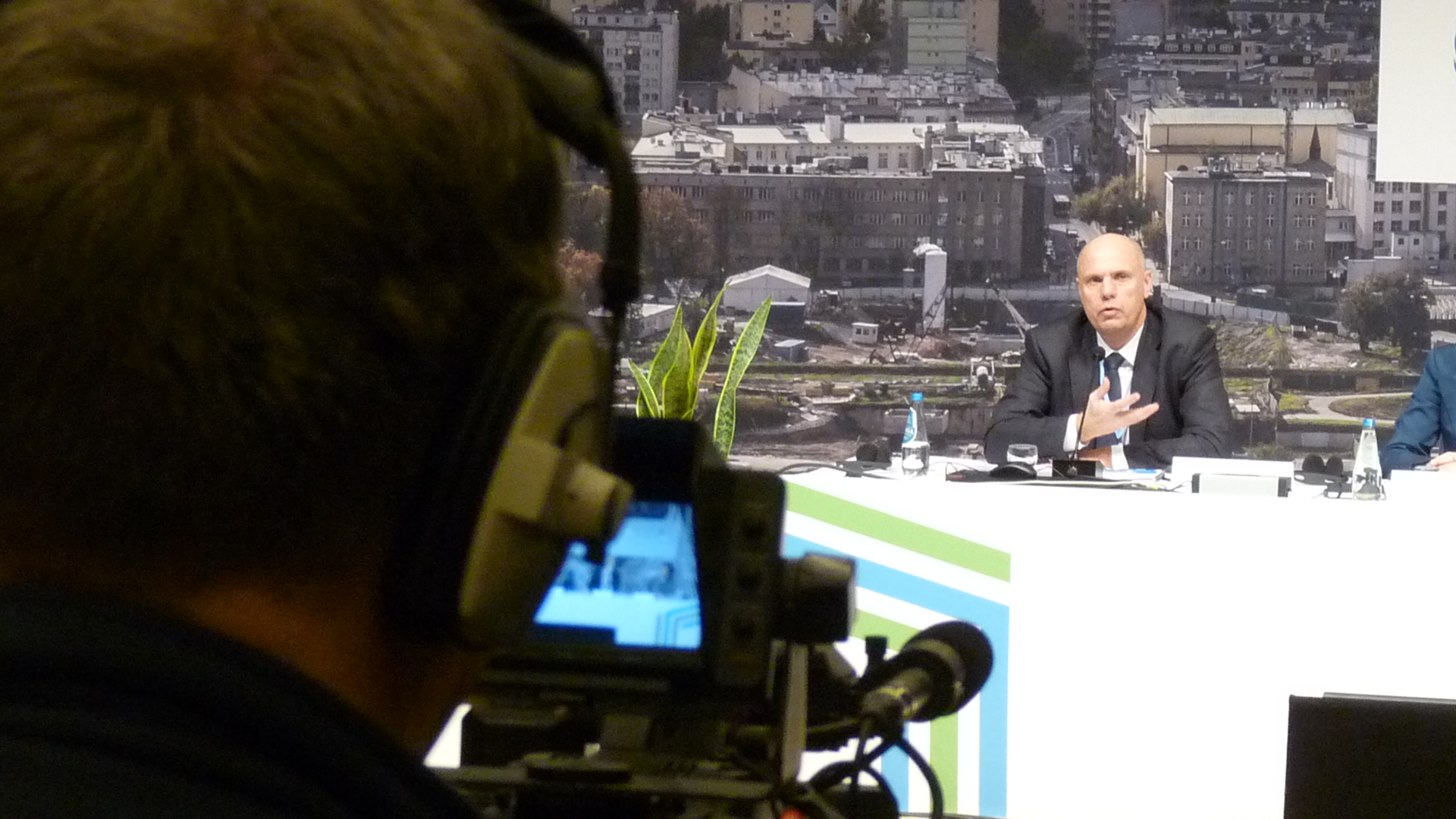
It's time for the private sector to do its bit
I'm at another sparsely attended press conference, this time about the UNFCCC's Ambition Loop, which throws down the gauntlet to private companies to crank up their climate change policies.
The climate change spokesman of Maersk, John Kornerup Bang, is explaining how his company committed last week to being carbon neutral by 2050, a task which – given the 20 to 25-year forward planning timescales involved in container shipping – means the first commercially viable zero-carbon container ships need to be on the seas by 2030.
Lisa Manley, from Mars (the chocolate company, rather than the planet), has now taken the mike, and is discussing her company's commitment to renewable energy, which has seen the business source all its energy from renewables in the U.S. and U.K., make advances in Mexico and recently sign a long-term renewables PPA in Australia.
Mars has also committed to reducing emissions from its global supply chain, also she wasn't able to offer specific examples of what role solar will play, when put on the spot by pv magazine.
Bertrand Camus, of water and waste treatment firm Suez has made a passing reference to the riots in Paris, and the need to make sure the shift to a circular economy is an inclusive one.

Finally, I'm through the front door
Wow, that was intense. Having presumed I could waltz in to the media area on my first day at COP for pv magazine, it took over an hour to get through the crush to register – by which time I'd already had all my passport details taken by Polish police for trying to take a picture of the venue. Welcome to Poland!
Having shuffled along two immense queues to get this far, I'm beginning to realise why, three years after the Paris climate agreement, the powers-that-be are only now sitting down to decide how to implement that pledge.
On the plus side though, in terms of gaining political buy-in for climate change legislation, they could probably just have a show of hands, because it felt like most of the world's population was trying to register.
My first taste of action was a pledge from the Polish authorities to do more to achieve the UN Framework Convention on Climate Change (UNFCCC from hereon in) goals. Disappointingly, it was attended by a handful of journalists in a vast lecture theatre, making you feel quite sorry for the speakers… maybe everyone's still trying to get in.
